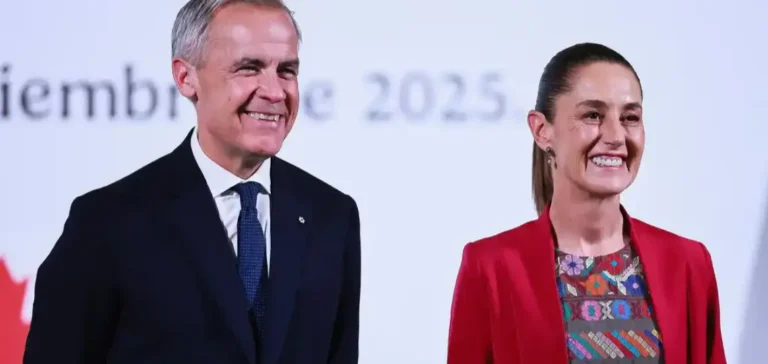Canada and Mexico have formalised a Global Strategic Partnership aimed at strengthening economic and security exchanges between the two countries, with particular focus on the energy, infrastructure and trade sectors. The announcement was made by Canadian Prime Minister Mark Carney and Mexican President Claudia Sheinbaum, amid increasing geopolitical reorganisation across North America.
Focus on energy infrastructure
Among the priorities set out in this new partnership are the construction and development of energy corridors, ports and railway networks. These investments aim to facilitate cross-border flows of goods, raw materials and energy components. The stated goal is to reinforce the resilience of continental supply chains and increase regional attractiveness for private investors in the sector.
Prime Minister Carney confirmed the launch of a trade mission to Mexico led by the Minister responsible for Canada–United States Trade, Dominic LeBlanc. This delegation will have the mandate to identify concrete investment opportunities in priority energy and logistics projects.
A security component tied to economic exchanges
The action plan also includes a bilateral dialogue on security aimed at combating transnational criminal networks, particularly in drug trafficking, money laundering and cybercrime. To this end, Canada will allocate CAD4.4mn ($3.2mn) through the United Nations Office on Drugs and Crime, in support of Mexico’s efforts against the illicit production and distribution of fentanyl.
In addition, CAD5.5mn ($4mn) will be invested in a programme led by the International Labour Organization (ILO) to facilitate the integration of migrants and strengthen the available workforce in Mexico, particularly in the logistics and industrial sectors.
Strengthening trade ties and regional value creation
This partnership also aims to boost trade between the two countries in areas such as critical minerals, agriculture and energy components. The governments seek to establish a stronger regional integration dynamic through regular engagements between ministers and heads of state.
Ahead of the FIFA World Cup 2026, which Canada will co-host with Mexico and the United States, authorities anticipate an economic impact of $2bn on the Canadian economy. This outlook reinforces the importance of infrastructure investments to support the expected increase in logistical and tourist flows.






















